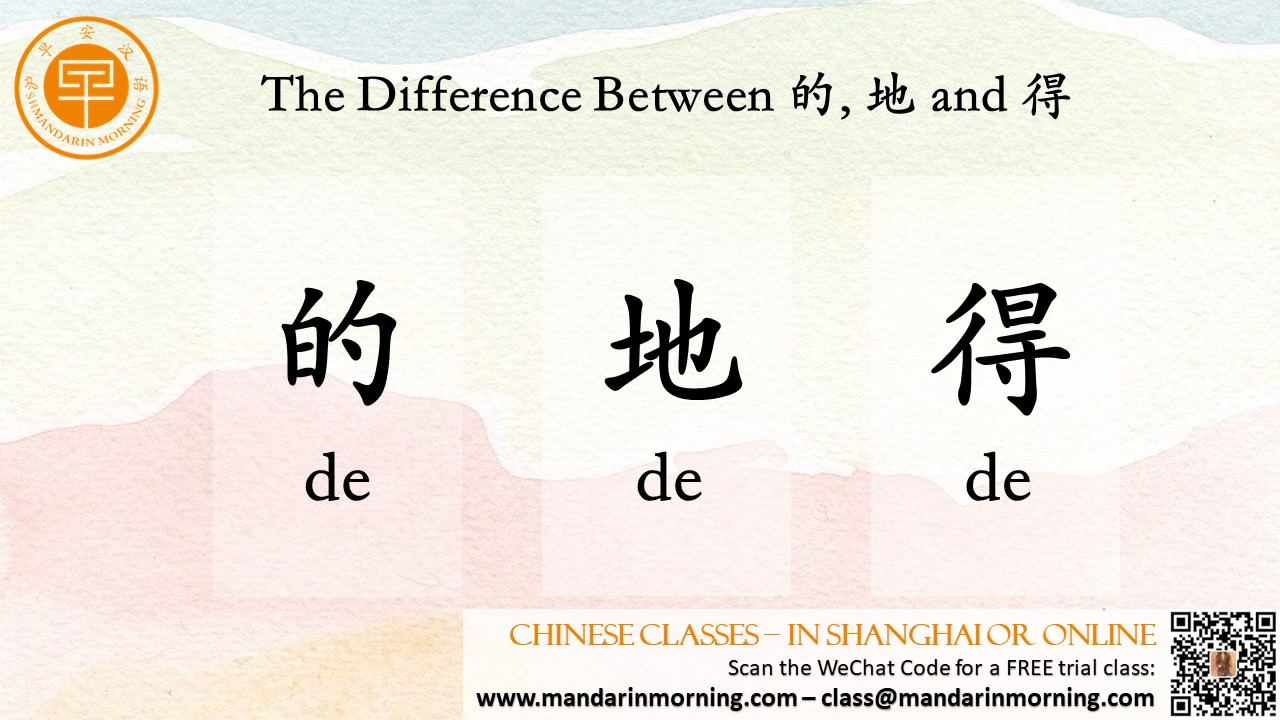The Chinese particles 的 (de), 得 (de) and 地 (de) sound the same. But they have different meanings. In this article we highlight the differences and learn how to use them correctly. The first 的 (de) is known as 白勺的 (bái sháo de) because it’s made up of the characters 白 (bái) and 勺 (sháo). Usage #1: 的 (de) is used to mark possession. It works like the apostrophe-"s" in English. Structure: Noun + 的 + Noun Examples: 奥利的手机 (ào lì de shǒu jī) - Ollie's cell phone 马丁的车 (mǎ dīng de chē) - Martin's car Usage #2: 的 (de) is also used to describe a noun. It can be helpful to think of it as "who, when, where, what, which, whom & that" in English. Structure: Description + 的 + Noun Examples: 穿连衣裙的女孩 (chuān lián yī qún de nǚ hái) - The girl who is wearing a dress. 很爱跳舞的男孩 (hěn ài tiào wǔ de nán hái) - The boy who really loves to dance. 最好的朋友 (zuì hǎo de péng you) - best friend This 得 (de) is placed after a verb, to describe how the verb is carried out. Structure: Verb + 得... Examples: 她喝得多,吃得少 (tā hē de duō, chī de shǎo) - She drinks more and eats less. 他学得快,忘得快 (tā xué de kuài, wàng de kuài) - He learns fast and forgets fast. 兔子跑得快,乌龟爬得慢 (tù zi pǎo de kuài, wū guī pá de màn) - The hare runs fast and the tortoise crawls slowly. 他中文说得流利,但汉字写得不好 (tā zhōng wén shuō de liú lì, dàn hàn zì xiě de bù hǎo) - He speaks Chinese fluently, but writes Chinese characters badly. This 地 (de) is known as 土也地 (tǔ yě de), since it’s made up of a 土 (tǔ) component on the left and a 也 (yě) on the right. You use it to turn an adjective into an adverb. For example: ”happy” (adj.) → “happily”(adverb) Structure: Adjective + 地 + Verb Examples: 开心 kāi xīn (happy), 开心地 kāi xīn de (happily), 开心地笑 kāi xīn de xiào (laugh happily) 伤心 shāng xīn (sad), 伤心地 shāng xīn de (sadly), 伤心地哭 shāng xīn de kū (cry sadly) 生气 shēng qì (angry), 生气地 shēng qì de (angrily), 生气地说 shēng qì de shuō (speak angrily) 大声 dà shēng (loud), 大声地 dà shēng de (loudly), 大声地说 dà shēng de shuō (speak loudly) |